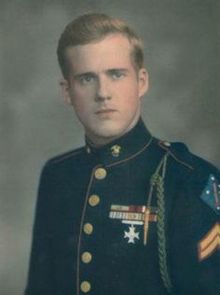China Marine (memoir)

E. B. Sledge, 1946
|
|
| Author | Eugene B. Sledge |
|---|---|
| Country | United States |
| Language | English |
| Genre | Military Memoir |
| Publisher | University of Alabama Press |
|
Publication date
|
May 10, 2002 |
| Media type | |
| Pages | 167 pp. |
| ISBN | |
| 940.54'1273-dc21 | |
| LC Class | D811 .S548 2002 |
| Preceded by | With the Old Breed: At Peleliu and Okinawa |
China Marine: An Infantryman's Life after World War II is the second memoir written by United States Marine Corporal Eugene B. Sledge, published posthumously with foreword by Stephen E. Ambrose, without subtitle, on May 10, 2002 by University of Alabama Press It was republished in paperback with the full title by Oxford University Press in July 2003. This book is the sequel to his first, better known, memoir, With the Old Breed: At Peleliu and Okinawa and Ambrose identifies it as the only account of the Marines stationed in postwar China. It has recently achieved wider public recognition as credited source material for the 2010 HBO miniseries The Pacific.
China Marine details Sledge's military duty in Okinawa after the battle to capture the islands, postwar service in the U.S. occupation of China, return to Mobile, Alabama and reintegration to civilian society. It contains brief accounts of the postwar Chinese political situation including a re-telling of Sledge's previously published account of the incident at Lang Fang, an armed confrontation between "two opposing Chinese forces" and Japanese who had not yet been evacuated from the country.
However the book's primary focus is the process of psychological rehabilitation of the author as he recovered from the horrors of his combat experience. Thus much of its content is deeply personal, such as his first meetings with his brother and parents and a disturbing incident at Auburn University where he realized the distance between his experience and that of those who had not been in the war.
Sledge's second book opens in 1945 with the First Marine Division remaining in Okinawa after the 82-day battle to clean up and prepare for their anticipated invasion of "Yokosuka Naval Base at the mouth of Tokyo Bay". None of the Marines expected to survive such an invasion. After the atomic bombings and Japan's precipitous surrender they did not celebrate, but rather were kept busy by a return to the intense manual labor of cleanup. In Sledge's words, "I think we were actually afraid to believe it was true...The memory of so many dead friends was still fresh in our minds."
...
Wikipedia
